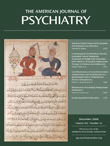Dr. Kendler Replies
To the Editor: I appreciate the comments of Dr. Rietschel et al. on my recent article (1) . I suspect that a long face-to-face discussion between us would yield many more areas of agreement than disagreement. For example, I argued that we will not easily move from gene discovery of the modest effect-sized loci that are likely to exist for psychiatric disorders directly to major overhauls of our diagnostic system. However, I agree with Dr. Rietschel et al. that gene discovery could, and hopefully will, lead to clarification of pathophysiology. That in turn might lead to insights that would usefully inform our nosology.
My article was certainly not meant to discourage psychiatric genetics investigations. Indeed, that is what I do in my “day-job.” Where we might part company is in our respective guesses about whether large effect genes are ever likely to be found for psychiatric illness. I am less optimistic than they are. Many studies have now been done of psychiatric disorders in relatively homogeneous populations, including Iceland, Polynesia, Finland, Ireland, and other areas more remote. None have yet revealed genes of large effect. If very large genetic effects for psychiatric disorders were commonly the result of gene-gene interactions, then the risk for psychiatric disorders would not strongly run in families, since such genetic combinations would typically be broken up in each new meiotic event. I also doubt we will be able to find “every” genetic contribution to its DNA base. Some effects may elude even our best scientific efforts.
As I reviewed with Ralph Greenspan in a recently published overview (2) , genetic studies in animals indicate that the vast majority of behavioral traits are influenced by large numbers of genes of small effect (also see the recent fine-mapping study of mouse behavior [3] ). There are exceptions, but they are rare. I suspect that we humans are rather typical of other species in this regard. However, I would not be unhappy to be proven wrong.
1. Kendler KS: Reflections on the relationship between psychiatric genetics and psychiatric nosology. Am J Psychiatry 2006; 163:1138–1146Google Scholar
2. Kendler KS, Greenspan RJ: The Nature of Genetic Influences on Behavior: Lessons from "Simpler" Organisms. Am Psychiatry. 2006; 163:1683–1694Google Scholar
3. Valdar W, Solberg LC, Gauguier D, Burnett S, Klenerman P, Cookson WO, Taylor MS, Rawlins JN, Mott R, Flint J: Genome-wide genetic association of complex traits in heterogeneous stock mice. Nat Genet 2006; 38:879–887Google Scholar



